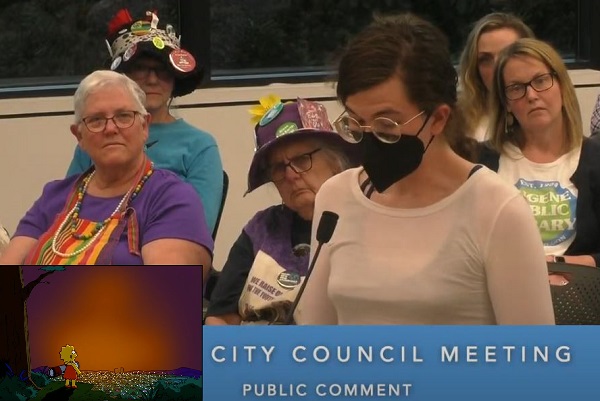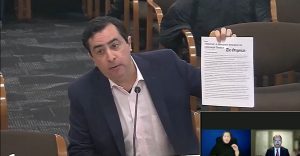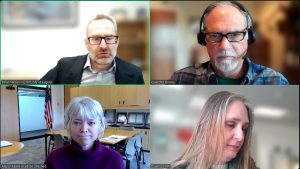City can save money, boost income from astrotourism
10 min read
Presenter: Misty Bowman has been a tireless advocate to reduce light pollution. Here she is speaking to the Eugene City Council June 24, 2024:
Misty Bowman (June 24, 2024): My name is Misty Bowman. I moved to Eugene about three years ago and I knew I not only wanted to stay, but help the city grow. The city of Eugene is proud of its environment and scenery, and yet we sorely lack in protecting one thing: our night skies. Our opportunities for creating and enhancing the beauty of Eugene at night are enormous, yet for the most part remain unrealized.
[00:00:34] I went and saw for myself what it meant when Dark Sky International recognized Oregon’s effort to have dark sky sanctuaries in Prineville, Oregon. I cried when I saw the Milky Way and wondered why the Emerald Valley does not let its stars shine at night.
[00:00:49] The city is facing wide-scale budget cuts, yet on the city’s website it says our road infrastructure is our most expensive asset. No wonder this is the case when we spare no pains to eradicate even the minutest shadow with our 10,000 streetlights at over $1,000 apiece. Let me say that again: 10,000 streetlights, one for every 15 citizens of Eugene, and more being added every year. I ask: How afraid of the dark are we?
[00:01:17] I stand before the City Council as a citizen concerned with how fast the city of Eugene’s light pollution is growing, a scale seven out of nine on the Bortle, or light pollution, scale at the epicenter.
[00:01:28] This means for the citizens at the center of our city, they would be lucky to see 1,000 stars at night. In the words of Mayor Lucy Vinis, important insect pollinators are negatively impacted by light pollution, threatening their ability to successfully reproduce and pollinate, and every spring and fall millions of birds migrate through Oregon at night, and light pollution is known to cause deaths of these birds. And research suggests artificial light at night can be hazardous to human health.
[00:01:58] Tonight, I urge the City Council to revisit City Code 9.6725, Outdoor Lighting Standards, a code that has remained untouched for 20 years, and replace it with Dark Sky International’s suggested City Code Ordinance for Lighting, which are guided by the five principles of responsible outdoor lighting.
[00:02:17] Presenter: July 8, 2024:
[00:02:20] Misty Bowman (July 8, 2024): My name is Misty Bowman and I’m a Dark Sky International advocate. I’m here to discuss the issue of light pollution. 20 years ago, the City Council passed City Ordinance 9.6725, Outdoor Lighting Standards, and since then, the ordinance has remained untouched and unenforced.
[00:02:38] In that time, Eugene has become another tragic statistic, seeing its light pollution grow on average 2% to 3% a year since. It doesn’t have to be this way.
[00:02:49] There’s a lot of things I could discuss here, how artificial light at night, or ALAN (again, ALAN means artificial light at night). I could discuss how ALAN is wasteful, unsafe, unpleasant.
[00:03:02] I apologize to anybody named Alan here tonight. Not a personal attack. And I do intend to bring these issues to the city’s attention. But tonight, I’d like to discuss a relevant issue, the effects of ALAN on the environment. Studies suggest that ALAN contributes to a city’s heat dome effect, as well as the air’s ability to filter pollution at night.
[00:03:26] Let me repeat that in simpler terms. Light pollution makes cities hotter and smoggier. This could be a unique opportunity for the city of Eugene, not just to enhance its environment as we work to fight climate change, but also an opportunity to engage with the cultural heritage of Oregon at large.
[00:03:46] Dark Sky International has recently recognized Oregon’s efforts to protect the night sky. And how amazing would it be if Eugene was added to those efforts. Tonight I urge the City Council to revisit, revise, and make a plan to enforce a new outdoor lighting standards ordinance, guided by Dark Sky International’s five principles of responsible outdoor lighting.
[00:04:11] Lights in Eugene should be: 1. Useful; only used where it is needed. 2. Targeted; lights should be shielded. 3. Low-level; lights should only be as bright as they are needed. 4. Controlled; lights should be on timers, dimmers, or motion switches. And 5. Lights should be warm-colored; yellow and orange lights scatter less than blue and white lights.
[00:04:37] Presenter: At the Eugene City Council July 22, 2024, Misty Bowman:
[00:04:42] Misty Bowman (July 22, 2024): My name is Misty Bowman. I’m a Dark Sky International advocate, and I’m here to discuss light pollution. Let’s say I want to walk to Round1 at the Valley Regal River Center to play some bowling, have a cider, go home about midnight.
[00:04:56] As a Dark Sky International advocate, I ask: How long until I’m met with extreme light pollution? And the answer is: I walk out and I see the entire mall and DMV parking lot lit up like a stadium.
[00:05:08] How long until I see wasteful lights? And the answer is: On the Greenway bicycle bridge we have unshielded lights, half of the lights spilling into the water and skies of our beautiful Willamette River. I don’t know how many of you can walk on water. I know this one guy who said he could but he lived a long time ago.
[00:05:29] How long until the lights are unpleasant? I enter Maurie Jacobs Park and immediately we have a high glare light in the shadows of trees causing your pupils to repeatedly dilate.
[00:05:40] How long until the lights are unsafe? With the high glare of light, somebody can be standing on the exact opposite side of the light and they could be wearing all black and I cannot see them at all, only a few yards away. And that’s if they’re standing in the light—they could easily be sitting in the shadows to the side.
[00:05:58] All of this on what the Eugene website calls ‘the crown jewel of Riverfront Park.’
[00:06:04] I encourage the City Council to plan a camping trip to a dark sky sanctuary on a new moon and see why light pollution is worth fighting. I urge the City Council to revise and enforce the outdoor lighting standards using Dark Sky International’s five principles for responsible outdoor lighting for guidance. Lights in Eugene should be useful, targeted, low-level, warm-colored, and controlled.
[00:06:25] Presenter: Sept. 23, 2024:
[00:06:28] Misty Bowman (Sept. 23, 2024): My name is Misty Bowman and I’m a Dark Sky International advocate. I’m here to once again bring attention to the issue of ALAN. Not Alan Zelenka, councilor of Ward 3, who I’m sure does a wonderful job, but ALAN as an ‘Artificial Light At Night.’ I know many on the City Council want the City of Eugene to shine just like our nickname, the Emerald Valley.
[00:06:50] Many on the City Council list environmental concerns, neighborhood livability, and promoting and conserving our public parks as policy goals, all things I agree with. Councilor Zelenka in particular says we need to be smart in our approach to development, growth, and density. I couldn’t agree more. My worry is that in all these goals, sensible, good lighting has not been part of this picture.
[00:07:15] So I would like to bring to the City Council’s attention at least one alternative lighting solution we can start pursuing in our public parks: luminescent gravel. In pedestrian and cyclist-only areas, there is rarely a need for any kind of bright ALAN. This is why many cities and parks and public parks are installing Dark Sky International-approved, environmentally-friendly luminescent gravel.
[00:07:41] This would give lighting to these pedestrian areas for up to 20 years and require little to no maintenance or electricity. Lighting for 20+ years and not a single watt needs to run through it.
[00:07:53] Tonight I once again urge the City Council to revise and enforce the outdoor lighting standards into a new ordinance guided by Dark Sky International’s five principles of responsible outdoor lighting.
[00:08:04] Lights in Eugene should be 1. Useful; only use where it is needed. 2. Targeted; lights should be shielded. 3. Controlled; lights should be on timers, motions, or dimmer switches. 4. Warm-colored; orange and yellow scatter less than white and blue. 5. Low-level; lights should only be as bright as needed.
Because, to quote Rev. Martin Luther King Jr., ‘Only when it is dark enough can you see the stars.’
[00:08:31] Presenter: Dec. 9, 2024:
[00:08:33] Misty Bowman (Dec. 9, 2024): My name is Misty Bowman. I’m a Dark Sky International advocate, and I’m here to discuss light pollution. Exciting things have happened in Oregon since I started coming to Council meetings in June. Cave National Monument and Preserve is now Oregon’s second dark sky international group park. Oregon also has our first dark sky international group community: Antelope, Oregon.
[00:08:56] Not only that but Sisters, Oregon is pressing forward on a Dark Sky International application as well. I don’t want Eugene to be left behind while the rest of Oregon reclaims their dark skies. So let me raise yet another reason to revise and enforce our outdoor lighting standards: light trespassing.
[00:09:14] Like light pollution, light trespassing is omnipresent in cities but goes woefully unaddressed. Light trespassing is exactly what it sounds like. It’s when unwanted light from one property shines unforgivingly onto another property. All over the city, businesses and streetlights trespass onto other businesses and residential areas.
[00:09:35] What’s more, this creates cascading effects. Businesses know that humans are drawn to light as moths are to a flame, so they get bright shining lights for all the world to see. Then other businesses are forced to compete with these lights and get big brilliant lights themselves. This is unhealthy for our environment, decreases neighborhood livability, and wastes money, both public and private.
[00:09:59] This could be prevented by a properly enforced lighting ordinance and putting a ceiling on light pollution—the same way there are ceilings on noise and air pollution in our city.
[00:10:10] I would say that the enforcement of our outdoor lighting standards in the past 20 years has been a disaster but that wouldn’t quite fit. See, disaster comes from the old Italian word, disastro or ‘ill-starred.’ If an ill-starred event happened in Eugene, would we even see those stars?
[00:10:30] I ask once again for the City Council to revise and enforce the outdoor lighting standards to a new ordinance, guided by Dark Sky International’s five principles of responsible outdoor lighting.
[00:10:41] Presenter: Jan. 27, 2025.
[00:10:44] Misty Bowman (Jan. 27, 2025): My name is Misty Bowman. I’m a Dark Sky International advocate, and I’m here to discuss light pollution. 23 years ago, the City Council passed an outdoor lighting ordinance. Four months later, episode 16 of season 14 of the animated sitcom series ‘The Simpsons’ aired an episode on light pollution. Since then, the Simpsons has only gotten worse, and so has the light pollution in Eugene.
[00:11:08] So tonight, I would like to further explain Dark Sky International’s second principle of responsible outdoor lighting, targeted lighting, and why it should not only be part of a revised and forced ordinance, it could also save the city $2 million.
[00:11:22] There is a term in lighting called nadir. Nadir is the point below the illumination in the light bulb. All lighting above 90 degrees nadir is wasted. It’s wasted as sky glow, light trespassing, and glare.
[00:11:41] Unshielded lights on land waste half their lighting. Unshielded lights on water waste 75% of their lighting. Dark Sky International estimates that the energy from light pollution cost every man, woman, and child in America $12 a year. In the city of Eugene, that’s $2 million a year. If that sounds too good to be true, look at Tucson, Arizona. They implemented Dark Sky International policies, and they ended up saving $2 million a year.
[00:12:10] So when you’re driving home tonight, realize those Cobra street lights, fishbowl, acorn, and lantern lights aren’t just causing unpleasant glare. They’re also literally burning up money before your eyes.
[00:12:23] I quote Lisa Simpson in ‘Excuse me while I miss the sky:’ No one ever wrote a poem about sickly orange glow barf.
[00:12:31] Presenter: With public comment to the City Council this week, Feb. 10, 2025, Misty Bowman:
[00:12:38] Misty Bowman (Feb. 10, 2025): My name is Misty Bowman, I’m a Dark Sky International advocate, and I’m here to discuss light pollution.
[00:12:44] I have talked to the City Council at length about the various negatives of excessive artificial light at night, or ALAN. How excessive ALAN costs the city up to $2 million a year, is hazardous to the environment and public health. Let me now talk about how addressing light pollution will bring positives to the city.
[00:13:03] Oregon is fast becoming a hotbed of astrotourism, or night sky tourism. We have the largest dark sky reserve in the world, the Oregon Outback, with a planned 11 million acres of protected dark skies upon completion.
[00:13:15] We have three of only 130 dark sky parks in the world, two dark sky towns, Sisters and Antelope, Oregon, and even a community in Lane County, Blue River, is pressing forward on a dark sky application. All this when many travel agencies are recognizing night sky tourism as one of the hottest new travel trends.
[00:13:36] The fact of the matter is people are coming to Oregon and are flying to Eugene already given we are the closest major airport to many of the sites I have just listed. These astrotourists, they’re not staying here, but they could. If Eugene and Lane County broadly controlled our sky glow, the Willamette National Forest could change.
[00:13:56] Currently, the night sky in the Willamette National Forest is massively polluted by Lane County. On the best of nights, there is a ghost in the sky called the Milky Way. However, if Eugene followed what much of Oregon is already doing, we could open up a Milky Way that has cast shadows in that forest for thousands of years.
[00:14:15] Instead of flying to Eugene and immediately leaving, these astrotourists could fly to Eugene and take the 91 bus to see the Milky Way. Not to mention people in Eugene as well. Make no mistake about it, this is an opportunity for Eugene to save money and make money.
[00:14:32] Tonight I again urge the City Council to revise and enforce the outdoor lighting ordinance to a new ordinance guided by Dark Sky International’s five principles of responsible outdoor lighting.
[00:14:43] Presenter: Misty Bowman asks Eugene to save money, and make money, by revising its outdoor lighting ordinance. She quotes a famous Springfield resident, Lisa Simpson:
[00:14:53] Lisa Simpson: It should be dark enough to see the stars up here. You stole my stars, Springfield! No one ever wrote a poem about sickly orange barf glow.





